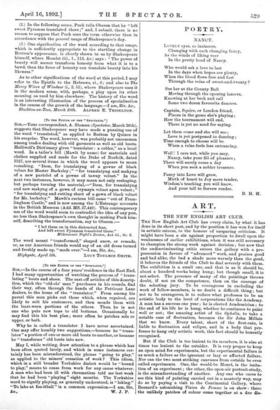[To THE EDITOR OP THE "SPECTATOR'] SIE, — In the course of
a four years' residence in the East End, I had many opportunities of watching the process of " trans- lating " boots and shoes. The cast-off articles of this descrip- tion, which the "old-do' man" purchases in his rounds, find their way, often through the hands of the Petticoat Lane dealers, to the home of the "translator." From among his parcel this man picks out those which, when repaired, are likely to suit his customers, and then mends them with the least-worn portions of the others. Thus, he is not one who puts new tops to old bottoms. Occasionally he may find this his best plan ; more often he patches sole or upper, or both.
Why he is called a translator I have never ascertained. One may offer humbly two suggestions,—because he "trans- lates " a portion of one or more old boots to another, or because he "transforms" old boots into new.
May I, while writing, draw attention to a phrase which has been often quoted lately, and which in some instances cer- tainly has been misunderstood, the phrase "going to play," as applied to the miners' cessation of work P This idiom, which in a still broader Yorkshire dialect would be "bound to play," means to cease from work for any cause whatever. A man who had been ill with rheumatism told me last week that he had been " playing " eight months. The Yorkshire word to signify playing, as generally understood, is " laking." "To lake at foo-itball " is a common expression.—I am, Sir, W. J. P.
































 Previous page
Previous page